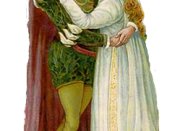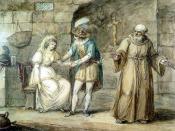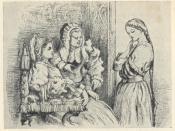George Aberto once said "above anything else, fate is what brings lovers together." In Shakespeare's play, Romeo and Juliet, fate, chance, and coincidence are all important to the development and eventually the conclusion of this tragedy. Without these three closely related themes the play would not have been able to make it out of the first act. These themes are pivotal to the development of the play and there are many instances where this is very obvious. These themes play a part in the feud between the Capulets and the Montagues, the invitation of Romeo to the ball, and the death of the two lovers, Romeo and Juliet.
For as long as the two families, The Capulets and The Montagues, can remember, they have both been at war with each other and held an "ancient grudge" (Prologue). The purpose and goal of this feud is never revealed thus it must be assumed through the Prologue that their hatred is solely based on tradition from past generations.
This feud is visible within the first line of Act 1 Scene 1 where Sampson, a servant of the Capulet family says that he will "not carry coals" (1.1.1). He says this in talking to another servant, Gregory, about how he will not be humiliated by a Montague servant. This allows the audience to see the importance of the feud between the Capulets and the Montagues. Romeo, a Montague, and Juliet, a Capulet, meet and fall in love at the ball in Act 1 Scene 5. This is visible in Romeos dialogue "O, she doth teach the torches to burn bright! / It seems she hangs upon the cheek of night / Like a rich jewel in an Ethiop's ear." (1.5.46-48). It is chance that Romeo's true love happens to be part of the...


